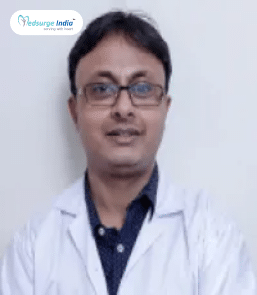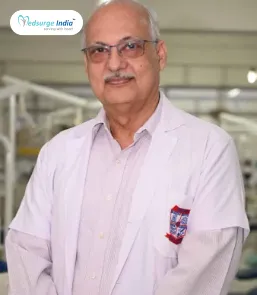Dental Treatment Cost in India
Unlock Exclusive Discount : Your Gateway to Premium Healthcare with Medsurge India Health Value Card.

Unlock Exclusive Discount : Your Gateway to Premium Healthcare with Medsurge India Health Value Card.


A beautiful smile is one of the positive factors that improve the quality and outlook to life, and self-image in our lives. For instance, a small protruding tooth is sufficient to change our facial appearance significantly. Proper dental care, timely identification, and management of oral diseases in capable dental surgeons and dental health workers can do wonders.
Dental surgeons manage a number of ailments such as dental cavities, gum diseases, oral malignancy, and disorders of the mouth, teeth, gums, and structures around the mouth. Since the past few years, the advancements made in dental technology have been quite spectacular in India. Let’s delve into the cost of dental treatment in India and the different types of dental treatment.
Dental treatment may refer to any type of procedure done on teeth, gums, jaws, or any other related oral structure executed by an oral and maxillofacial surgeon or a periodontist. It entails tooth pulling, implantology, flap, and graft surgery, impacted wisdom teeth, endodontic treatment, and maxillofacial surgery.
It is performed in cases of oral cancer, nonrestorable caries, periodontal disease, jaw osteonecrosis, traumatized teeth, TMDs, sleep apnea surgery, and cleft lip and palate. Dental surgery in simple terms involves the treatment of diseases, disorders, or conditions of the teeth and mouth with the ultimate goals of preventing and controlling diseases, correction of abnormalities, and relief of pain and discomfort.
Dental Treatment cost in India starts from 200 USD. The price of the treatment can also be extended to 8000 USD. This usually depends on the patient’s choice of procedure and the type of location or hospital.
Different Types of Dental Treatment Cost in India
| Treatment | Price Starting From |
| Dental Filling | 150 USD |
| Dental Implant | 500 USD |
| Dental Bridges | 250 USD |
| Teeth Whitening | 200 USD |
| Crowns | 150 USD |
| Dental Bonding | 100 USD |
| Root Canal Treatment | 250 USD |
| Extractions | 100 USD |
| Dentures | 350 USD |
| Tooth Contouring and Reshaping | 80 USD |
| Gingivectomy | 180 USD |
| Cities | Price Starting From |
| Delhi | 100 USD |
| Mumbai | 150 USD |
| Noida | 80 USD |
| Gurgaon | 120 USD |
| Chennai | 150 USD |
| Kolkata | 80 USD |
| Bangalore | 150 USD |
Please know that the total prices will depend on serval factors.
Also read:- Top 10 Dentists in India
The concept of dental disease as an important public health concern can open up dental health care in daily life. Bearing this in mind with the assistance of a professional dentist an expert medical team and modern means one can alleviate the problems related to teeth and gums.
The following is a list of the most frequently used dental treatments in Indian dental care. Let us dive into it:
This procedure is designed to restore cavities and damaged teeth by utilizing materials such as amalgam, composite resin, porcelain, and gold to seal the affected areas and avert further decay. Dentists often opt for composite resin fillings due to their aesthetic appeal, as many patients prefer fillings that match the color of their natural teeth, and advancements in composite materials continue to enhance their effectiveness. It is advisable to consult with the dentist to determine the most appropriate filling material based on individual preferences.
Dental implants serve as artificial tooth roots that establish a robust foundation for either fixed or removable replacement teeth, closely mimicking the appearance of natural teeth. These implants are surgically inserted into the jawbone and can support various dental prosthetics, including crowns, implant-supported bridges, or dentures. The benefits of implants include improved chewing ability, prevention of rapid bone loss, enhancement of speech, and an overall improvement in facial aesthetics.
Bridges are utilized to replace missing teeth by securing artificial teeth to the adjacent natural teeth. This structure consists of two dental crowns placed on the teeth flanking the gap, with a false tooth positioned in between. Bridges can effectively replace a single tooth or a series of missing teeth. They play a crucial role in restoring chewing and speech functions, as well as preventing the shifting of teeth into the gaps.
Professional teeth whitening procedures are designed to lighten and enhance the appearance of discolored or stained teeth, thereby improving the overall smile. Commonly referred to as dental bleaching, this process utilizes hydrogen peroxide as the active bleaching agent, which is applied directly to the teeth in gel form. The results can endure for several months, potentially lasting up to three years, provided one avoids smoking and the consumption of red wine, tea, or coffee. While at-home whitening kits are accessible, it is advisable to seek treatment from a licensed dentist, as the chemicals involved may adversely affect sensitive teeth and enamel, and could lead to gum irritation.
Porcelain veneers, also known as dental porcelain laminates, are ultra-thin, custom-crafted shells made from tooth-colored porcelain or resin composite materials, intended to cover the front surfaces of teeth for aesthetic enhancement. These veneers are affixed to the teeth based on the desired color, shape, size, or length. Individuals with chipped or fractured teeth, stains from discoloration, those who have undergone root canal treatment, or those with gaps between teeth can greatly benefit from veneers. They provide a cosmetic solution by only covering the front of the tooth, resulting in a whiter and brighter appearance, and serve as a swift remedy to enhance one’s smile.
Crowns are utilized to encase a damaged or weakened tooth, effectively restoring its shape, size, and strength while also enhancing its visual appeal. Permanent crowns can be constructed from various materials, including stainless steel, gold or other metal alloys, porcelain fused to metal, resin, or ceramic. Typically, dental crowns have a lifespan ranging from five to fifteen years, contingent upon maintaining good oral hygiene and minimizing exposure to wear and tear from biting or chewing hard foods.
Dental bonding also referred to as teeth bonding, is a cosmetic dental procedure that involves the application of a tooth-colored resin material, which is subsequently hardened using a specialized light. This process enables the resin to adhere effectively to the tooth surface. It is recognized as one of the simplest and most cost-effective cosmetic dental treatments available. Compared to veneers and crowns, dental bonding necessitates the least amount of enamel removal. The longevity of the bonding material typically ranges from three to ten years before it requires maintenance or replacement.
Root canal treatment (RCT) is a dental procedure aimed at salvaging a tooth that has been severely infected or irreparably damaged. This is achieved by excising the infected pulp and nerve, followed by sealing the tooth to avert further infection. Common indications for RCT include pulpitis (infection of the pulp), fractured teeth, or a nerve that is deteriorating. Symptoms that may necessitate this treatment include pain during biting or chewing, gum swelling, pus discharge from the affected tooth, facial swelling, and discoloration of the tooth. The procedure involves the removal of bacteria, filling the root canal, and sealing it with either a filling or a crown.
Tooth extraction refers to the process of removing one or more teeth from their sockets due to damage, decay, or other dental complications. This procedure is often performed to address issues such as overcrowded teeth, significant tooth decay, damage to the pulp, or periodontal diseases. Dental extractions can be carried out by specialists, including oral surgeons and periodontists.
Dentures are artificial devices designed to replace absent teeth, supported by the surrounding soft and hard tissues within the oral cavity. These devices are removable, allowing for easy cleaning. Complete dentures are utilized when all teeth are absent, while partial dentures are employed when some natural teeth remain intact. Dentures are crafted to closely mimic natural teeth, enhancing both aesthetic appeal and functionality in speaking and chewing. Typically, complete dentures are constructed entirely from plastic, whereas partial dentures incorporate both plastic and metal components.
Tooth contouring and reshaping are dental procedures aimed at addressing minor dental imperfections such as chipped, crooked, overlapping, or cracked teeth. This technique, also referred to as enameloplasty or odontoplasty, is generally painless and requires no recovery time. It serves to smooth the teeth, eliminate discoloration, and enhance their glossy appearance, ultimately improving the overall smile.
Gingivectomy is a surgical procedure employed to treat gum diseases characterized by inflammation and the retraction of gums from the tooth neck, resulting in the formation of gaps known as gum pockets or periodontal pockets. Common symptoms of gingivitis include red, swollen, and bleeding gums. The presence of bacteria and tartar within these pockets can lead to further inflammation; thus, gingivectomy is essential in preventing additional damage and potential tooth loss.
A: While they won't require any complicated oral procedures, routine dental exams, X-rays, cleanings, whitenings, and fillings are regarded as routine dental services because they help prevent more dental complications.
A: Fluoride treatments are among the available therapy choices. A fluoride treatment can occasionally reverse a cavity in its very early stages and help repair the enamel of your tooth if the problem has just recently begun. More fluoride is present in professional fluoride treatments than in toothpaste, mouthwash, and tap water.
A: Eighty percent of adults said they had fillings. Of those surveyed, 34% said they had had a root canal filling and 34% said they had at least one crowned tooth. Adults typically had 0.8-capped teeth and 4.3-filled teeth.
A: The most popular kind of dental implants in use today are made of titanium. Their track record of accomplishments is extensive. They are also the most adaptable tooth restoration option available today. Their metal components and substructures make it possible to restore many difficult instances.

Dentist
Senior Consultant
10+ years of experience
KMC Hospital, Hampankatta, Mangaluru
View Doctor
Dentist
Senior Consultant
17+ years of experience
Narayana Multispeciality Hospital, Barasat, Kolkata
View Doctor
Dentist
Senior Consultant
10+ years of experience
NH Rabindranath Tagore International Institute of Cardiac Sciences, Kolkata
View Doctor
Dentist
10+ years of experience
NH Rabindranath Tagore International Institute of Cardiac Sciences, Kolkata
View DoctorDentist
2024+ years of experience
NH Rabindranath Tagore International Institute of Cardiac Sciences, Kolkata
View Doctor
Dentist
26+ years of experience
Rabindranath Tagore Surgical Centre, Hiland Park, Kolkata
View Doctor
Dentist
10+ years of experience
Rabindranath Tagore Surgical Centre, Hiland Park, Kolkata
View Doctor
Dentist
Senior Consultant
12+ years of experience
Rabindranath Tagore Surgical Centre, Hiland Park, Kolkata
View DoctorDentist
Senior Consultant
10+ years of experience
Rabindranath Tagore Surgical Centre, Hiland Park, Kolkata
View DoctorDentist
Senior Consultant
10+ years of experience
NH Rabindranath Tagore International Institute of Cardiac Sciences, Kolkata
View Doctor









By using our site, you agree to our Terms and Conditions, Privacy Policy and Refund Policy. Medsurge India provides reliable healthcare information and treatment options to support informed decision-making. Our content is designed to support and complement the guidance of your treating doctor, helping you feel informed and confident throughout your healthcare journey. We also Accept International Payments.

Copyright © 2025 NSM ONLINE SOLUTIONS PRIVATE LIMITED. All rights reserved.